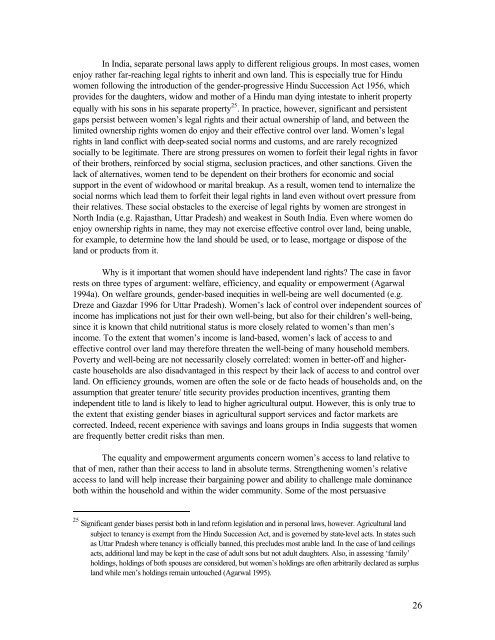Access to Land in India
Create successful ePaper yourself
Turn your PDF publications into a flip-book with our unique Google optimized e-Paper software.
In <strong>India</strong>, separate personal laws apply <strong>to</strong> different religious groups. In most cases, women<br />
enjoy rather far-reach<strong>in</strong>g legal rights <strong>to</strong> <strong>in</strong>herit and own land. This is especially true for H<strong>in</strong>du<br />
women follow<strong>in</strong>g the <strong>in</strong>troduction of the gender-progressive H<strong>in</strong>du Succession Act 1956, which<br />
provides for the daughters, widow and mother of a H<strong>in</strong>du man dy<strong>in</strong>g <strong>in</strong>testate <strong>to</strong> <strong>in</strong>herit property<br />
equally with his sons <strong>in</strong> his separate property 25 . In practice, however, significant and persistent<br />
gaps persist between women’s legal rights and their actual ownership of land, and between the<br />
limited ownership rights women do enjoy and their effective control over land. Women’s legal<br />
rights <strong>in</strong> land conflict with deep-seated social norms and cus<strong>to</strong>ms, and are rarely recognized<br />
socially <strong>to</strong> be legitimate. There are strong pressures on women <strong>to</strong> forfeit their legal rights <strong>in</strong> favor<br />
of their brothers, re<strong>in</strong>forced by social stigma, seclusion practices, and other sanctions. Given the<br />
lack of alternatives, women tend <strong>to</strong> be dependent on their brothers for economic and social<br />
support <strong>in</strong> the event of widowhood or marital breakup. As a result, women tend <strong>to</strong> <strong>in</strong>ternalize the<br />
social norms which lead them <strong>to</strong> forfeit their legal rights <strong>in</strong> land even without overt pressure from<br />
their relatives. These social obstacles <strong>to</strong> the exercise of legal rights by women are strongest <strong>in</strong><br />
North <strong>India</strong> (e.g. Rajasthan, Uttar Pradesh) and weakest <strong>in</strong> South <strong>India</strong>. Even where women do<br />
enjoy ownership rights <strong>in</strong> name, they may not exercise effective control over land, be<strong>in</strong>g unable,<br />
for example, <strong>to</strong> determ<strong>in</strong>e how the land should be used, or <strong>to</strong> lease, mortgage or dispose of the<br />
land or products from it.<br />
Why is it important that women should have <strong>in</strong>dependent land rights? The case <strong>in</strong> favor<br />
rests on three types of argument: welfare, efficiency, and equality or empowerment (Agarwal<br />
1994a). On welfare grounds, gender-based <strong>in</strong>equities <strong>in</strong> well-be<strong>in</strong>g are well documented (e.g.<br />
Dreze and Gazdar 1996 for Uttar Pradesh). Women’s lack of control over <strong>in</strong>dependent sources of<br />
<strong>in</strong>come has implications not just for their own well-be<strong>in</strong>g, but also for their children’s well-be<strong>in</strong>g,<br />
s<strong>in</strong>ce it is known that child nutritional status is more closely related <strong>to</strong> women’s than men’s<br />
<strong>in</strong>come. To the extent that women’s <strong>in</strong>come is land-based, women’s lack of access <strong>to</strong> and<br />
effective control over land may therefore threaten the well-be<strong>in</strong>g of many household members.<br />
Poverty and well-be<strong>in</strong>g are not necessarily closely correlated: women <strong>in</strong> better-off and highercaste<br />
households are also disadvantaged <strong>in</strong> this respect by their lack of access <strong>to</strong> and control over<br />
land. On efficiency grounds, women are often the sole or de fac<strong>to</strong> heads of households and, on the<br />
assumption that greater tenure/ title security provides production <strong>in</strong>centives, grant<strong>in</strong>g them<br />
<strong>in</strong>dependent title <strong>to</strong> land is likely <strong>to</strong> lead <strong>to</strong> higher agricultural output. However, this is only true <strong>to</strong><br />
the extent that exist<strong>in</strong>g gender biases <strong>in</strong> agricultural support services and fac<strong>to</strong>r markets are<br />
corrected. Indeed, recent experience with sav<strong>in</strong>gs and loans groups <strong>in</strong> <strong>India</strong> suggests that women<br />
are frequently better credit risks than men.<br />
The equality and empowerment arguments concern women’s access <strong>to</strong> land relative <strong>to</strong><br />
that of men, rather than their access <strong>to</strong> land <strong>in</strong> absolute terms. Strengthen<strong>in</strong>g women’s relative<br />
access <strong>to</strong> land will help <strong>in</strong>crease their barga<strong>in</strong><strong>in</strong>g power and ability <strong>to</strong> challenge male dom<strong>in</strong>ance<br />
both with<strong>in</strong> the household and with<strong>in</strong> the wider community. Some of the most persuasive<br />
25 Significant gender biases persist both <strong>in</strong> land reform legislation and <strong>in</strong> personal laws, however. Agricultural land<br />
subject <strong>to</strong> tenancy is exempt from the H<strong>in</strong>du Succession Act, and is governed by state-level acts. In states such<br />
as Uttar Pradesh where tenancy is officially banned, this precludes most arable land. In the case of land ceil<strong>in</strong>gs<br />
acts, additional land may be kept <strong>in</strong> the case of adult sons but not adult daughters. Also, <strong>in</strong> assess<strong>in</strong>g ‘family’<br />
hold<strong>in</strong>gs, hold<strong>in</strong>gs of both spouses are considered, but women’s hold<strong>in</strong>gs are often arbitrarily declared as surplus<br />
land while men’s hold<strong>in</strong>gs rema<strong>in</strong> un<strong>to</strong>uched (Agarwal 1995).<br />
26


